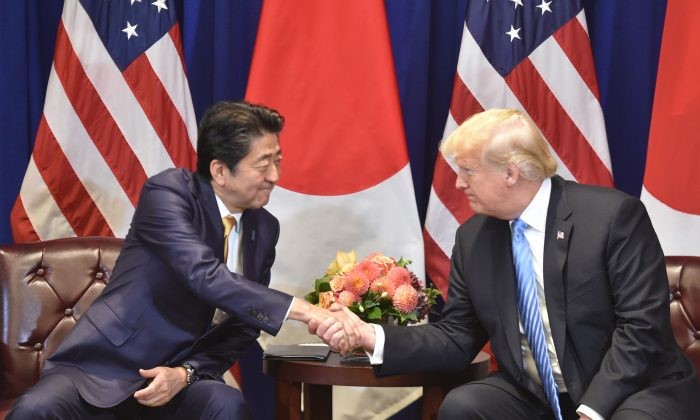

The US and Japan announced intentions to start negotiations on a new free trade agreement after a meeting between President Donald Trump and Japanese Prime Minister Shinzo Abe on Wednesday September 26. This indicates that the two countries would not impose new tariffs on each other during the course of the agreement.

The agreement comes while Trump’s trade war with China and Canada is getting more intense every day. Japan agreed to negotiate on a bilateral free trade agreement as a part of President Donald Trump’s bid to reshape America’s trade relations with its partners.
“The United States and Japan will enter into negotiations, following the completion of necessary domestic procedures, for a United States-Japan Trade Agreement on goods, as well as on other key areas including services, that can produce early achievements,” the joint statement said.
Robert Lighthizer, the US Trade Representative, told reporters that the administration planned to seek fast-track trade negotiation powers from Congress under the current Trade Promotion Authority. The trade negotiations are otherwise lengthy processes taking months or a year.
Trump initiated a trade war with China and also a number of its allies including Canada that shows no signs of slowing down. The 25% tariff on all imported steel and 10% tariff on aluminium tariffs imposed in May and June strained relationships with most of its allies.
Earlier to this, a preliminary trade agreement negotiation with European Commission President Jean-Claude Juncker failed to draw any conclusion.
The US maintains 12 bilateral free trade agreements, according to the US Trade Representative and International Trade Commission, and two major regional free trade agreements. The negotiations with Canada also failed and Trump announced his plan to effectively terminate the North American Free Trade Agreement.
The agreement with Japan intends to block the imposition of additional tariffs during the negotiations.
“The United States and Japan will conduct these discussions based on mutual trust, and refrain from taking measures against the spirit of this joint statement during the process of these consultations,” the two sides said. “In addition, we will make efforts for the early solution of other tariff-related issues.”
While the development does not reverse Trump’s tariffs on imports of steel and aluminium, the statement indicates that the US would not impose further tariffs on Japan during the negotiations. Japanese carmakers in particular were worried about the possible effects of a new tariff on imported autos and auto parts that the Trump administration has been considering.
Japan's steel and aluminium industries were also affected by the steel and aluminium tariffs. Since steel and aluminium export contributes only 4 per cent of the total Japanese goods exports, they did not affect its economy significantly and the country did not negotiate on it. However, as for auto export is concerned, the U.S. market is the most important for them and the country is not expected to consider the auto tariffs the same way if Trump goes ahead with the same.
Responses








